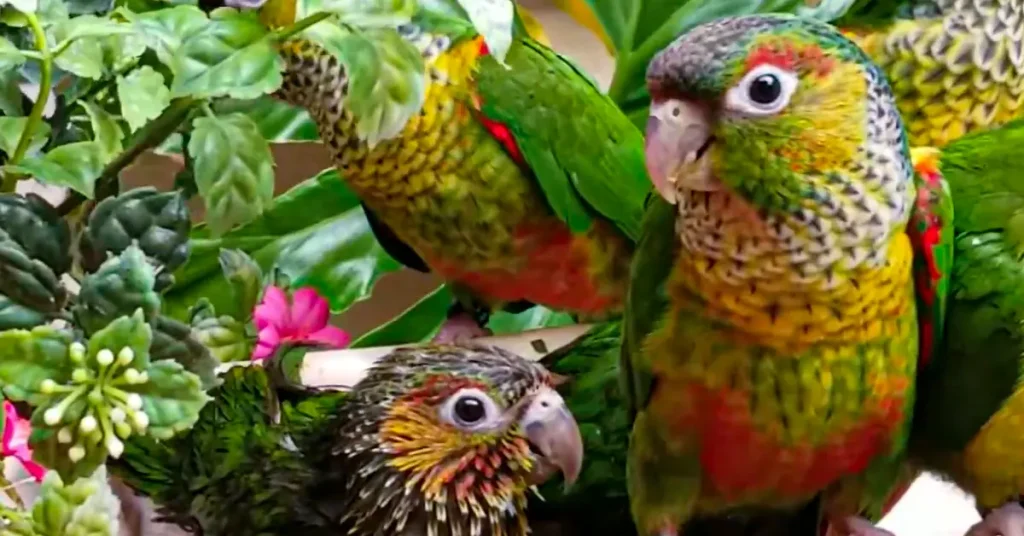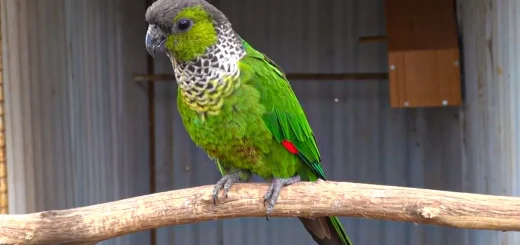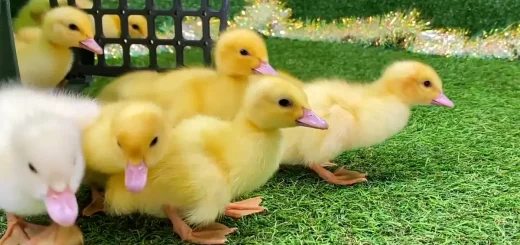Opaline Black Capped Conure Species Profile, Diet and Nutrition

Are you looking for a feathered friend who is easy to maintain, social, and someone you can spend good time with? Then, the Opaline Black Capped Conure is the perfect bird for you.
These stunningly cute birds may initially be a bit shy, but they eventually make good social companions. They are well known for their intelligence and captivating personality.
Being one of the smallest conures, they are easy to care for. Over time, the bird becomes curious and loving to its adopted family.
But this isn’t it. Before considering Opaline Black Capped Conure as a pet, there is much more to learn. Let’s dig deep into today’s guide and discover the kith and kin about the mesmerizing bird.
A Quick View On The Origin And Care Guide For Opaline Black Capped Conure
| Aspects | Details |
| Origin | South-Western Amazon Basin and Adjacent East Andean slopes |
| Lifespan | 25-30 Years |
| Scientific Name | Pyrrhura rupicola |
| Size and Weight | 25cm (9.84 inches), 55-70 grams. |
| Diet | Pallets, Seeds, Slightly cooked veggies, Fruits, Nuts, Berries |
| Needs | Balanced Diet, Exercise, Mental Stimulation, Training |
| Nature | Social and Friendly |
| Maintenance Level | Easy |
Opaline Black Capped Conure Characteristics
The Opaline Black Capped Conure has a very distinctive pattern from other parrot cinures. It also has its personality, communication style, and way of life.
Physical Description
This conure’s average size is 25cm or around 9.84 inches, weighing 55-70 grams. The Opaline mutation on its body gives a beautiful look to its existing pattern. They can have different patterns with the same colors.
A crown of brownish-black feathers adorning their head, giving them their namesake “black-capped” title. Their body is a captivating canvas of emerald green, with a hint of blue shimmering on their abdomen.
If you take a closer look, you will see their cheeks boast a brownish-green hue, while their neck and chest showcase a mesmerizing pattern of black and white feathers featuring delicate scales.
Temperament And Personality
The Black Capped Conure personality is fantastic. It has a very high energy level. It mostly has a joyful and social personality. These little birdies require a lot of mental stimulation from their surroundings and owners.
It means you must be around it and give it enough time in a day. These birds do great in busy environments and stay happy indoors. But you must ensure they are entertained and have enough scope to channel their energy.
The featured social butterfly is easy to train. With proper attention and training, it can mimic sounds, learn fascinating tricks and solve simple puzzles. Be careful with the bird, as inadequate mental stimulation and lack of attention may cause mental and physical health problems in these birds.
Vocalization
The Black Capped Conure is quieter than most other conures. Still, in a healthy environment, you will see it chirping, whistling, and having playful chatter. With training, you can make it learn simple phrases and talk. Also, you can train to minimize its noise.
The best part is that these birds can sing, and sometimes they sing while asleep.
Bathing Or Cleaning
The Black Cap Green Cheek Conure loves to stay clean and can bathe itself. They love to bathe and preen themselves regularly. You can provide them with a shallow dish of clean water for bathing or mist them with lukewarm water a few times a week.
Breeding
Black Conure birds typically reach sexual maturity at 1-3 years old. During mating season in February and March, they roost in small groups. In each nesting attempt, they lay 4 to 7 eggs.
The incubation period is 24 days, and after hatching, the babies are kept under parental care for 7 to 8 weeks.
Lifelong Needs Of An Opaline Black Capped Conure
You must have some essentials to give the best care to your black headed conure. The following are the things that you should consider getting.
Cage
The ideal cage for your capped conure depends on how long it stays in its cage. If you plan on keeping it inside the cage for most of the day, the cage should be double its size. The bigger, the better.
A smaller cage would be fine if it only uses its cage for sleep time. However, a cage size of 18″ x 18″ x 24″ is well enough. Besides, the cage should be spacious enough so that you can frequently change its water and food bowls.
Keep multiple toys for your bird inside the cage. This will help her stay active and use her energy when you are not around.
Perch
You must try your best to give your birdie the natural experience as much as possible. To serve this purpose, use texture perches or natural perches. They will help your conure trim its toenails and beak from time to time on its own. The texture of the perch will also keep your bird’s feet healthy. Keep various perches in size so the conure can enjoy hoping and playing around with them.
Stand
Place play stands inside the cage that promotes the bird doing different activities to keep it active. Opt for various styles of stands so the bird doesn’t get bored with the same play stand.
Perfect Diet For Opaline Black Capped Conure
Whether you give your conure a pallet or seed diet, your bird must get all the nutrition it needs. In that case, relying on a specific diet isn’t enough. In the nature or wild, these birds source their food from seeds, fruits, berries, nuts, and vegetables.
So, ensure you give your bird all of those now and then, maintaining a balance. Do not overfeed. You can also consult an aviary health care professional or veterinarian to optimize its diet.
A mineral rock and cuttlebone in its cage can also add to its nutrition gain.
How to Take Care of an Opaline Black Capped Conure?
Having a conure as a pet requires great commitment. It is your responsibility to care for it as best you can.
Daily Care
- Provide a clean and spacious cage with proper ventilation and lighting.
- Offer a balanced diet of pellets, fresh fruits and vegetables, and occasional treats.
- The conures dip pieces of their food in water, making it a soup. So, ensure access to clean, fresh water at all times.
- Allow 2-4 hours of supervised out-of-cage time for exercise and interaction.
- Clean the cage regularly (at least weekly) with a safe disinfectant.
- Replace soiled food and water bowls daily.
Health Care
- Schedule annual checkups with a qualified avian veterinarian.
- Observe your bird’s behavior for signs of illness, such as lethargy, loss of appetite, excessive feather plucking, or unusual droppings.
- Maintain a clean and hygienic environment to prevent the spread of diseases.
- Always be there for your beloved pet bird when it needs you.
FAQs
What Is The Personality Of A Black-Capped Conure?
Black-capped conures, including the opaline mutation, are known for their playful and energetic personalities. They are curious and love to explore their surroundings, often climbing, swinging, and investigating anything that catches their eye.
They thrive on companionship and bond deeply with their owners, becoming affectionate and cuddly companions.
Are Black-Capped Conures Noisy?
Black capped conures, including the Opaline one, are shy and do not vocalize much. However, if they’re healthy and happy, they can be very energetic and chirp often. The chirping and friendly chattering aren’t bothersome.
But, in irritation or pain, it might make annoying noises. If it does, get it checked by an aviary health service provider and train the birdie to reduce the noise.
How Long Do Black Capped Conure Live?
The Black Cap Conure bird has an average lifespan of 25-30 years. They may live for a couple more years in captivity with exceptional care.
Wrap Up
As you have read this far, hope you now have an overview of the Opaline Black Capped Conure. Before deciding, consider your lifestyle and ability to provide for their needs.
Ask yourself these questions.
- Are you prepared for a 25-30 year commitment?
- Can you dedicate daily time for interaction, playtime, and cage cleaning?
- Can you afford the initial and ongoing costs of quality food, cages, toys, and veterinary care?
If the answers are all “Yes!” then consider getting one.








